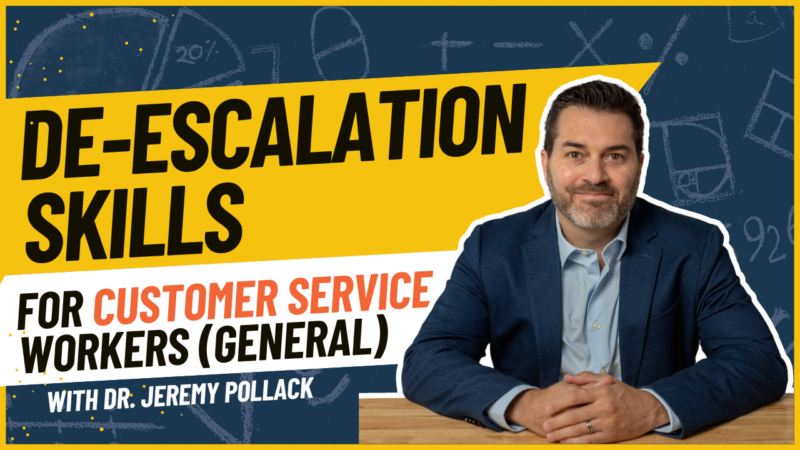Table of content
With how fast paced workplaces are today, conflict is inevitable. However, there are great ways to manage conflict in your organization effectively to positively affect team dynamics, employee satisfaction, and overall productivity. Understanding and implementing de-escalation role play scenarios empowers you and your team to develop your conflict resolution skills.
Understanding De-Escalation and Its Role in Conflict Resolution
De-escalation is an essential part of conflict resolution. It serves as a proactive measure to prevent disputes from spiraling out of control, making everything safer and healthier for the mental welfare of those involved.
These techniques reduce the intensity of a conflict and allow all parties to be heard and respected as you develop your emotional intelligence skills. This helps resolve the immediate issues and also helps preserve relationships.
The Impact of De-Escalation Training
Investing in de-escalation training can transform how your team interacts during all of these possible tense situations. This training gives you the skills that are needed to manage your emotions and approach conflicts with a calm, focused mentality.
The benefits extend beyond resolving disputes since they also help improve your communication skills and help you understand others better.
The Relevance of De-Escalation Training Across Industries
De-escalation techniques are universally applicable across pretty much any sector of the workforce, from customer service and healthcare to education and corporate spaces. Each of these industries faces unique challenges that can benefit from specialized de-escalation strategies. That is why this training is an invaluable addition to any professional development program.
The Importance of De-Escalation Role Play Scenarios
Role play scenarios are a dynamic and effective method to practice de-escalation techniques in a controlled, safe environment. They give you and your employees a good understanding of real-life situations they might encounter, so they are better prepared when they do happen.
Role play scenarios allow participants to experience realistic conflict situations, helping them to apply theoretical knowledge in practice. This hands-on approach is effective in building confidence and competence in handling real-world conflicts.
Tips for Conducting Effective De-Escalation Role Plays
- Set Clear Goals: Each role play should have specific learning objectives tailored to your industry’s common conflicts.
- Simulate Real-Life Situations: Come up with scenarios that reflect typical disputes your team might encounter in their roles so they enhance the relevance and applicability of the training.
- Encourage Reflection: After each role play, you should always hold a debrief session where all of the participants can discuss what they learned, what they could have done differently, and how they can apply these insights in their roles.
Ideas and Examples of De-Escalation Roleplay Scenarios
Verbal De-Escalation
In verbal de-escalation, the emphasis is on using specific language and tone to reduce the intensity of the confrontation before it escalates too far. Effective verbal de-escalation training allows you to select words that calm the other person rather than provoke them, focusing on clarity and empathy.
For instance, the best roleplay scenarios might involve navigating a heated discussion with a frustrated customer or resolving misunderstandings among team members. This approach is extremely useful in customer service and management, where the right communication prevents escalation and builds trust.
Using the HEARD method can make these scenarios even better because they allow you to use a structured technique to address and diffuse conflicts effectively.
Non-Verbal De-Escalation
Non-verbal cues are just as powerful as verbal strategies when it comes to de-escalation. In reality, these non-verbal cues can sometimes speak louder than words. When you have specific roleplaying scenarios, it allows you to focus on controlling your own body language to exude calmness and reassurance.
Techniques for non-verbal de-escalation include maintaining appropriate eye contact, ensuring an open posture, and using gestures that signal understanding and peace rather than aggression. The great part is that you can use these skills in so many different settings, from healthcare to law enforcement, where the right non-verbal response can quickly lower the stakes.
Roleplays might simulate situations where verbal communication is limited, emphasizing how body language can either escalate or calm a potential conflict.
Customer Service De-Escalation
In customer service de-escalation training, participants should be able to engage in role plays that mirror real-life customer interactions and can help them develop their conflict resolution skills.
For example, scenarios might include handling a customer who is upset about a delayed order or dealing with complaints about product quality. When you implement these scenarios, you and your team learn to use specific phrases to acknowledge the customer’s frustration, offer solutions, and communicate effectively to lower the tension.
These role plays can also allow you to focus on using body language and controlling your tone of voice to convey empathy and reassurance. It shows you how to transform a potentially negative experience into a positive one for the customer. Make sure you craft the scenarios in your customer service training to reflect common challenges you face at your company, providing practical skills that can be immediately applied in daily interactions.

Workplace De-Escalation
Unlike customer service de-escalation scenarios, workplace de-escalation training often includes role play scenarios that simulate typical office conflicts, such as disagreements over project management or clashes between different departments.
One scenario could involve a misunderstanding between team members about roles and responsibilities, teaching participants how to clarify communication without escalating the tension. Another scenario might address how to intervene in a dispute between colleagues over resource allocation, highlighting the importance of neutral language and fair solutions.
These role plays give your employees experience using their newly acquired skills to handle disputes calmly and constructively. The goal is to get everyone back to a collaborative and supportive work environment. By practicing these scenarios, employees learn to navigate workplace conflicts effectively, fostering a culture of mutual respect and understanding.
Classroom De-Escalation
Classroom de-escalation training provides educators with role play scenarios that simulate the unique nature of classroom challenges. For instance, one scenario might involve managing a student who frequently interrupts lessons and showing teachers how to employ verbal cues and positive reinforcement to encourage more appropriate behavior.
Another scenario could deal with de-escalating conflicts between students, guiding teachers in your school on how to use mediation techniques to help students express their feelings and resolve their differences constructively.
These role plays are designed to help educators maintain a calm and productive learning environment, even under stressful conditions. By practicing these scenarios, teachers learn effective strategies for minimizing disruptions and fostering a supportive classroom atmosphere.
Healthcare De-Escalation
De-escalation in healthcare incorporates scenarios that are critical for managing intense emotions in medical environments. One common scenario might involve a patient who is agitated due to long wait times or anxiety about a diagnosis. Through role play, healthcare workers learn to use calming language, demonstrate empathy, and provide clear, comforting explanations to help ease the patient’s distress.
Another scenario could involve de-escalating a situation where family members are upset about a patient’s care, teaching staff how to effectively communicate care plans, and exercising empathetic listening when it comes to family concerns without escalating tension. These scenarios prepare healthcare professionals to handle emotional volatility sensitively and professionally, ensuring they maintain safety and trust in healthcare settings.
Enhance Your Team’s De-Escalation Skills
By integrating de-escalation role play scenarios into your training programs, you equip your team with the necessary tools to handle workplace conflicts effectively. This improves interpersonal dynamics but also contributes to a more productive and positive organizational culture. Explore our de-escalation training and specialized industry workshops to find the best fit for your team’s needs and enhance their proficiency in managing and resolving conflicts.




